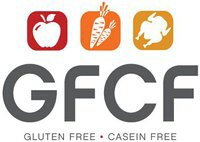I don’t know that I have ever actually discussed this. I had a parent contact me and ask about the GFCF diet.
Basically, their child has been on it for a year and they haven’t seen any improvement.
They asked for my opinion, which I shared. Personally, I don’t buy into the whole diet thing. There is little if any scientific evidence that shows any benefit for kids with #Autism.
Having said that, many families swear by it. It’s hard not to stand up and take notice when so many people think it’s the greatest thing in the world.
We have Celiac in my family and the GFCF diet can literally be the difference between life and death. So, I’m very familiar with the diet from that perspective.
My personal thoughts are that kids that do better on the diet, are simply responding to the absence of an allergen. On the other hand, I often wonder how much of the success stories are people seeing what they need or want to see?
I’m not judging anyone for pursuing the GFCF diet as it’s actually a very healthy diet that most people would benefit from.
Even if the diet does work for some people on the #Autism spectrum, that doesn’t mean it will work for everyone.
So I ask you. How do you feel about the GFCF diet in regards to improving the life of your child with #Autism? Do you think it works, if so, why?
Have you tried the diet with your child?
Let’s have an honest, open discussion about this because many parents are desperately looking for answers or options.
Much like the vaccine debate, this can be a hot issue and I only ask that we respect everyone’s views, even if we don’t agree. Maybe we can all learn something from each other. After all, we’re all on the same journey and want what’s best for our children.





I think it is tougher to differentiate between “worth the effort” and “not worth the time/money/energy” if your kids are on the less severe end of the spectrum. I have three in three different places … profound, severe and one Aspie with serious GI issues … all with allergies, growth problems, immune issues. The GI impact was easy to see in the seriously GI impacted one, but the behavioral impact was most visible in the profound one. It, however, had no impact on her speech. If your kids are higher functioning, it may be tough to figure out what helps with what unless you have a huge shocking change.
My son has a dairy allergy, and now soy too as i believe. I do as well – life threatening.( actually , im supposed to carry and epi-pen, but live on benadryl most of the time).
We did a dairy-free/reduced gluten diet which seems to help with digestive issues. It does not, however, eliminate the most problematic thing, the aggression. It seems a good choice for allergy sufferers, but i also do not buy into it can ‘cure” autism or reduce behaviors, because in our case, it has not. I think the diet has been over-promoted as a quick cure all. ( btw, hoping your son never has to use the epi-pen, but thank God they are around).
I think the person has already answered the question for themselves: the diet works for some, not so much for others. It definitely does not take away autism, nor cure it, but it can help with constipation, sleep disorders, and things like that. I always ask myself if autism can manifest itself so diversely, how can the diet work for everyone? It wouldn’t make sense! I am all for it but only if it is helping if any way, if not I don’t really see the point in spending the extra money (gluten free food is not cheap!) and investing so much energy in monitoring what your child eats at school, at social gatherings, etc.
@SR well said
@reality_autism I tried GF when we suspected Celiac. It took months to see the results. It helped but artificial sugar was another thing to remove tummy ache
My son has MSPI (milk/soy protein intolerance) as well as Asperger’s and ADHD. We didn’t realize it was both dairy and soy until he was in first grade (we knew about the soy intolerance), and when we pulled him off both dairy and soy it was wonderful for his gut. Did it help the autism? No. Did I expect it to help the autism? No. lol But I hoped it would help his gut, which it did. So we follow a special diet, but not for the autism…for allergy reasons.
GFCF is good when it is needed. But you cannot “cure” autism as a lot of parents seem to think. If your child suddenly stops being autistic at all after changing his or her diet, s/he was not autistic. S/he had a food intolerance and you are just spreading more cure garbage that desperate parents will eat up and ultimately become more miserable because of once it doesn’t “fix” their child. That said, a person can have BOTH an ASD and food intolerances. I am one of those people. I have AS (among other things) and issues with gluten and casein. To the best of my knowledge…i am not going to suffer any damage from it, but casein makes me ill (like…vomiting and miserable ill…though i still indulge in ice cream and sod the consequences) and gluten tends to make me hyper. When I have the money and patience to forgo those substances, I feel a lot better (due to laying off the casein ) and others are less exhausted by being around me (when i leave the gluten alone). However, I still have symptoms of AS because this does not do ANYTHING specifically for ASDs at all.
@S very well said. 🙂
I agree, GFCF diet does not cure autism, but if it helps with your child’s extreme behaviors, like screaming all day long, every day at school, bolting out of the room, attacking people, hitting and biting and acting real crazy in general, then it’s worth the effort. Honestly, any talk about “curing” autism, which is usually either genetic or autoimmune in nature is kind of ridiculous. Anybody with autoimmune disease has to work hard to maintain their healthiness after reducing their symptoms or going into remission, or it will return. I have autoimmune disease myself and my two children have it. Once you are caught into that vicious cycle, your body will always tend to return back to the unhealthy state.
The GFCF diet really helps my son, when we follow it strictly. He had alot of inflammation- constipated, chronic congestion and swollen tonsils, and would stop breathing at night. It was scary. He was really hyperactive and out of control, not sociable and always running off grabbing things, obsessively touching things or opening and closing doors over and over. If he wanted to do something you couldn’t stop him. He calmed down alot on the diet, and once we figured out the other allergies he had (food allergies and environmental), he got alot healthier, gained weight, and the sensory issues and alot of the extreme behaviors lessened. You have to be strict with the diet and make sure to supplement certain vitamins like D, Calcium, B vitamins, enough protein and fat, etc, which no one told me to do at first. He ended up with low vitamin D and got sick alot for a few months before we figured this out. Some kids react better to stricter diets like the SCD diet that eliminates sugar and complex carbs, which can feed inflammation quite a bit. I recommend using a dietician if you do these diets. It doesn’t hurt to try. When my son cheats on his diet he acts quite crazy and stims non stop, and then his behavior goes really bad. It’s hard to keep him on it, but we try.
There actually IS scientific evidence that GFCF, if done correctly, can benefit SOME ASD kids. LADDERS at MGH is currently running a few clinical trials to try to differentiate which kids it is likely to help and which it may not.
We’ve been GF/CF for most of my son’s life. It helps a ton. That said, both my sn kids have physical reactions to gluten and dairy (as well as soy) and I am sure that’s why. I’d be crabby too if my digestion were messed up.
I have a 5 year old son with ASD his OT advised me head on to start my son on GFCF diet I googled it. The problem is my son don’t eat anything with a texture of the food that he won’t like. Since he is also speech delayed I am not sure what he doesn’t like. All I know is he likes plain, white and soft rice for sure and cooked pasta with no spaghetti sauce. Sometimes, french fries or something that is crispy with breading. That’s it and milk of course. The rest he won’t it. I don’t know what explanation is that it has to be creamy white, soft, smooth or clear really clear soup. If he sees or feels any small chopped veggie or onions or anything at all he won’t eat. So, how can put him on a diet?
@CzarinaAngeles That’s a very good question. The first thing that popped into my head was Monk. I mean that in the most endearing way possible. I love Monk and I have a child the same way.
Believe it or not but Speech therapy can help with this. That’s something we learned as well. I’m in the same boat. How do you put a child on a very restrictive diet that you’re lucky to get eating at all?
We said.
@lostandtired Hi I agree his developmental pediatrician recommended that my son goes on speech therapy together with his Occupational Therapy. If only we can get a slot. We are on wait list to 4 speech centers and clinic for the past 5 months we still can’t get a slot. We went to as far as Cavite (we learned about this speech patho recommended by a friend) that was a month since we spoke over the phone we are still waiting for a slot 🙁
@CzarinaAngeles there’s not enough therapists out there. Would be a great career with tons of job security.
@lostandtired @CzarinaAngeles yep I heard most of them go abroad for greener pastures. Good thing my son’s Godmother is owner of a SPED school and has an in-house OT otherwise by now my son will still be wait listed in neuro centers 🙁
Our psychologist told us the day of diagnosis, not to buy into it. We don’t do it with our son. But I can understand that it can show improvement in some people. And I’ve actually been told that unless you consult with a doctor to make sure you’re getting the right nutrients, the GFCF diet is unhealthy since most of the foods lack major ingredients that the person needs.
The GF diet is healthy. The problem is that you have to make sure that you’re getting what you need in other places. It’s similar to not eating meat. You need to make sure you get protein etc from another source.
Good point. Thank you.
I’m not sure how I feel about it either. We have one son on GF-Dairy Free (egg free) because he really has intolerance and has an outright egg allergy. Since he’s stuck more to his diet over the last two years, his stomach-intestinal problems have recovered for sure, and that helps his mental state tremendously (he’s my OCD-sensory dysfunction one). With my Autism disorder son, we do watch what he eats — like too much artificial coloring, additives, etc., and I still swear that BLUE Gatorade causes children to be crazy anyway 🙂 Sooo…I think there might be some foods that do interfere with cognitive processing and really eating less chemicals and eating more gentle natural foods that are agreeable and digestible and less likely to causes allergies is probably a good idea anyway. Sorry Twinkies 🙂
@DLaubacher Well, don’t be too sorry. Hostess is going out of business. No more Twinkies.
I agree that it works for some, and not for others. I think this can be explained by the fact that families with autism have a genetic tendency toward other autoimmune disorders such as chrohns and celiac. My husband has crohns, has 4 cousins on the spectrum, and two of them have crohns. I think that for many parents this is an excellent intervention on 2 fronts: first, it does no harm, and second, whether associated with the child’s actual ASD or not, our kids DO have a tendency to have GI issues. That’s just me. We saw some mild to moderate improvement in our older son. Meanwhile, when I took our little guy off of casein, he was like a meth addict coming down from a high. And when he came down he looked me in the eye for the first time in months. Not a cure by any stretch of the imagination though. Interesting article recently put out by the American Academy of Pediatrics- even they are starting to acknowledge this connection.
http://pediatrics.aappublications.org/content/130/Supplement_2/S160.extract?cited-by=yes&legid=pediatrics;130/Supplement_2/S160
@jjean3940 Very well said. Thank you for sharing.